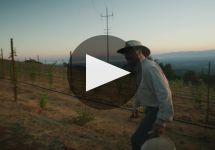Ridge Lytton Springs Red Blend 2022
-
Wilfred
Wong -
Wine
Enthusiast -
James
Suckling - Decanter
-
Wine
Spectator - Vinous
-
Robert
Parker
Most Gifted



Product Details
Your Rating
Somm Note
Winemaker Notes
Complex nose of boysenberry, cigar box, anise and sage. Full-bodied with well-coated tannins and balanced acidity. Notes of plum, blackberry, mineral, pepper and dark chocolate.
Blend: 67% Zinfandel, 19% Petite Sirah, 11% Carignane, 3% Alicante Bouschet
Professional Ratings
-
Wilfred Wong of Wine.com
When I tasted the 1973 Lytton Springs Zinfandel upon its release in the early 1970s, I fell head over heels for wines made from these vineyards. The 2022 has re-kindled that feeling. This is the second time I tasted this vintage (the first time was a few weeks ago at the vineyard site with the Ridge crew and colleagues in the business. All I can say is, "Wow!" This wine excels with aromas and flavors of beautiful mixed spices, dried flowers, and a bounty of berries. Serve this with a slow-cooked lamb stew, and see for yourself. (Tasted: September 22, 2024, San Francisco, CA)
-
Wine Enthusiast
The densely packed nose of this legendary old vine field blend of Zin, Petite Sirah, Carignane, and Alicante gives aromas of crushed blackberry, purple flowers and rich earthy spices, while the palate brings black cherry, olive and licorice flavors in a framework of opulent tannin that will age effortlessly for more than a decade.
Cellar Selection -
James Suckling
This is the kingpin of Ridge’s Sonoma County heritage blends and it doesn’t disappoint. Equal parts fruity, spicy and savory on a full body braced by moderate tannins. Judicious oak spices like cedar and cigar box complement pure, ripe blackberries and raspberries and a dash of black pepper. Known to age well for decades.
-
Decanter
This bottling marks the 50th Lytton Springs from Ridge, and appropriately, the wine is beguiling and intense—pure Americana and emblematic of Ridge's commitment to the heritage varieties and vines in California. Lytton Springs is home to 100-plus-year-old Zinfandel vines interplanted with Petite Sirah and Carignane, among a few other varieties. This bottling has become a standard bearer for the notion of California Zinfandel: smoky clove spices, toasted cinnamon sticks, bramble fruits and spicy black plums. The palate shows intense concentration, red and black plums, black pepper, muddled mint leaves and an undertone of dried anise and thyme. Delicious and built to age.
-
Wine Spectator
Like a beast that's been tamed, this red is genteel and polished on the outside but dark and fervent deep down, with expressive flavors of blackberry, briar patch, savory anise and pepper. Zinfandel, Petite Sirah, Carignane and Alicante Bouschet.
-
Vinous
The 2022 Lytton Springs 50th Anniversary is a characterful edition of this classic cuvée, notable for its élevage in only American oak. Exuberant cherry/berry fruit and licorice meet with grilled herbs, tanned leather, vanilla and dill, all energized by juicy acidity. This is a large-scale wine that will certainly stand the test of time. The clarity and precision here are commendable, especially packaged in such a broad-shouldered frame. Fabulous.
-
Robert Parker's Wine Advocate
The 2022 Lytton Springs 50th Anniversary is composed of 67% Zinfandel, 19% Petite Sirah, 11% Carignane and 3% Alicante Bouschet. It opens with initial touches of glossy new American oak—dill and toasted coconut—and gives way to kaleidoscopic black and red plums, cherries and berries, plus accents of hibiscus and potpourri. The full-bodied palate features generous, spicy flavors. It’s structured by abundant, powdery tannins and lively acidity and has a long, detailed finish. Winemaker Shauna Rosenblum says this 2022 was crafted using only American oak, a shift from the blend of French and American oak used in the past. It has resulted in a particularly pure, transparent expression that opens dramatically with air, and this 2022 Lytton Springs will benefit from several years in the cellar.
Other Vintages
2021- Vinous
-
Wilfred
Wong -
Jeb
Dunnuck -
Wine
Spectator
-
Wine
Enthusiast - Decanter
-
James
Suckling -
Wilfred
Wong - Vinous
-
Wine
Spectator -
Wine &
Spirits
-
Wilfred
Wong - Vinous
-
Connoisseurs'
Guide -
Jeb
Dunnuck -
Wine
Enthusiast -
Wine
Spectator
-
Robert
Parker -
Wilfred
Wong -
Wine
Enthusiast -
Jeb
Dunnuck
-
Tasting
Panel -
Wilfred
Wong -
Robert
Parker -
Jeb
Dunnuck
-
James
Suckling -
Jeb
Dunnuck -
Wine
Spectator -
Robert
Parker -
Wine &
Spirits
-
Connoisseurs'
Guide -
Jeb
Dunnuck -
Wilfred
Wong -
Wine
Spectator
-
Wilfred
Wong -
Robert
Parker
-
Tasting
Panel -
Wilfred
Wong -
Robert
Parker -
Wine
Spectator
-
Wilfred
Wong -
Connoisseurs'
Guide
-
Tasting
Panel
-
Robert
Parker
-
Connoisseurs'
Guide -
Wilfred
Wong -
Robert
Parker -
Wine &
Spirits -
Wine
Spectator
-
Wine
Spectator -
Connoisseurs'
Guide -
Robert
Parker -
Jeb
Dunnuck
-
Robert
Parker -
Connoisseurs'
Guide -
Wine &
Spirits
-
Wine &
Spirits -
Robert
Parker
-
Robert
Parker
-
Wine
Spectator -
Robert
Parker

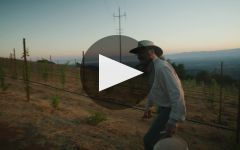
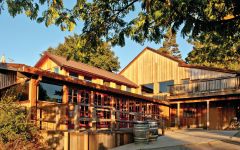

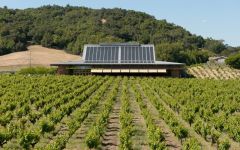
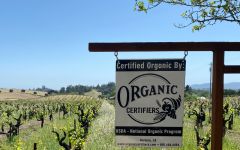
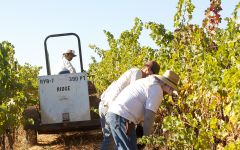
RIDGE's history begins in 1885, when Osea Perrone, a doctor and prominent member of San Francisco's Italian community, bought 180 acres near the top of Monte Bello Ridge in the Santa Cruz Mountains. He planted vineyards and constructed a winery of redwood and native limestone in time to produce the first vintage of Monte Bello in 1892. The historic building now serves as the RIDGE production facility.
In 1962, Ridge Vineyards made its first Monte Bello, and two years later its first zinfandel. The RIDGE approach is straightforward: find the most intense and flavorful grapes, guide the natural process, draw all the fruit's richness into the wine. Decisions on when to pick, when to press, when to rack, what varietals and what parcels to include and when to bottle, are based on taste. To retain the nuances that increase complexity, Ridge winemakers handle the grapes and wine as gently as possible. There are no recipes, only attention and sensitivity.
In August 2021, Ridge Vineyards joined International Wineries for Climate Action (IWCA), a group of like-minded wineries that are dedicated to decarbonizing the global wine industry. RIDGE is committed to achieving Net Zero by 2050 and completes a biannual greenhouse gas audit utilizing the World Resources Institute Greenhouse Gas (GHG) Protocol methodology and be verified by an internationally accredited, third-party auditor.

With hundreds of red grape varieties to choose from, winemakers have the freedom to create a virtually endless assortment of blended red wines. In many European regions, strict laws are in place determining the set of varieties that may be used, but in the New World, experimentation is permitted and encouraged resulting in a wide variety of red wine styles. Blending can be utilized to enhance balance or create complexity, lending different layers of flavors and aromas. For example, a red wine blend variety that creates a fruity and full-bodied wine would do well combined with one that is naturally high in acidity and tannins. Sometimes small amounts of a particular variety are added to boost color or aromatics. Blending can take place before or after fermentation, with the latter, more popular option giving more control to the winemaker over the final qualities of the wine.
How to Serve Red Wine
A common piece of advice is to serve red wine at “room temperature,” but this suggestion is imprecise. After all, room temperature in January is likely to be quite different than in August, even considering the possible effect of central heating and air conditioning systems. The proper temperature to aim for is 55° F to 60° F for lighter-bodied reds and 60° F to 65° F for fuller-bodied wines.
How Long Does Red Wine Last?
Once opened and re-corked, a bottle stored in a cool, dark environment (like your fridge) will stay fresh and nicely drinkable for a day or two. There are products available that can extend that period by a couple of days. As for unopened bottles, optimal storage means keeping them on their sides in a moderately humid environment at about 57° F. Red wines stored in this manner will stay good – and possibly improve – for anywhere from one year to multiple decades. Assessing how long to hold on to a bottle is a complicated science. If you are planning long-term storage of your reds, seek the advice of a wine professional.

A multifaceted and highly reputable sub-region of Sonoma, Dry Creek Valley is responsible for a wide range of wine styles—both red and white. One of the smallest AVAs in California, Dry Creek Valley has a winning combination of ideal geography and climate. Fertile, well-drained soils create concentrated varietal character while long, warm days, bookended by cool nights, allow grapes to reach full phenolic ripeness and balance. The warm and welcoming appellation is home to a number of family-owned vineyards and wineries that place a strong emphasis on sustainable farming practices.
Zinfandel reigns supreme here and still produces in a great number of very old vineyards—often 100 years old or older. These old vines create a powerful, voluptuous and sultry wine unlike those of any other region. Sauvignon Blanc, the valley’s signature white grape, also performs exceptionally well. Many other varieties grow comfortably here, including Cabernet Sauvignon, Grenache and Syrah. Petite Sirah is often found in blends with Zinfandel.
